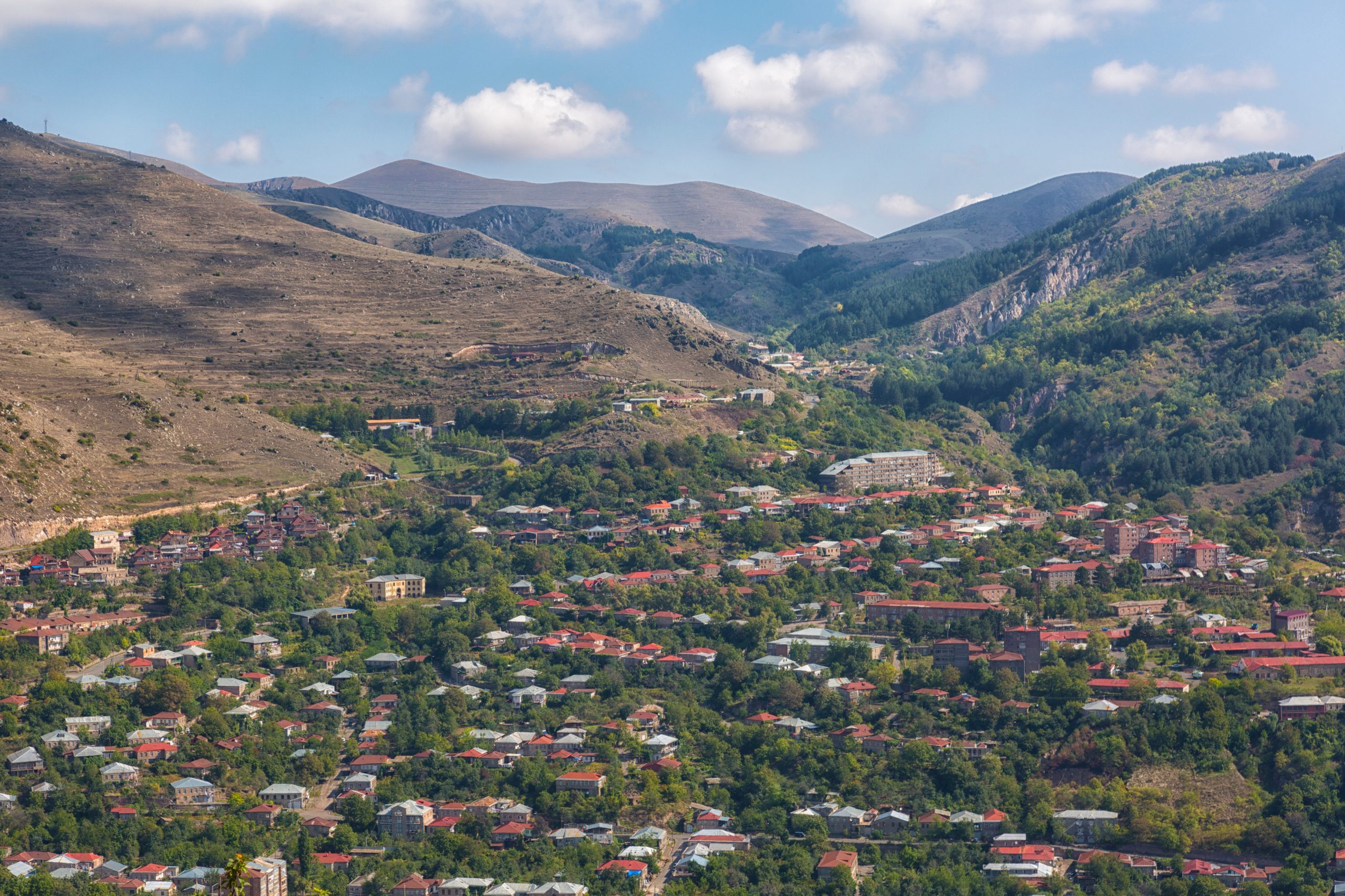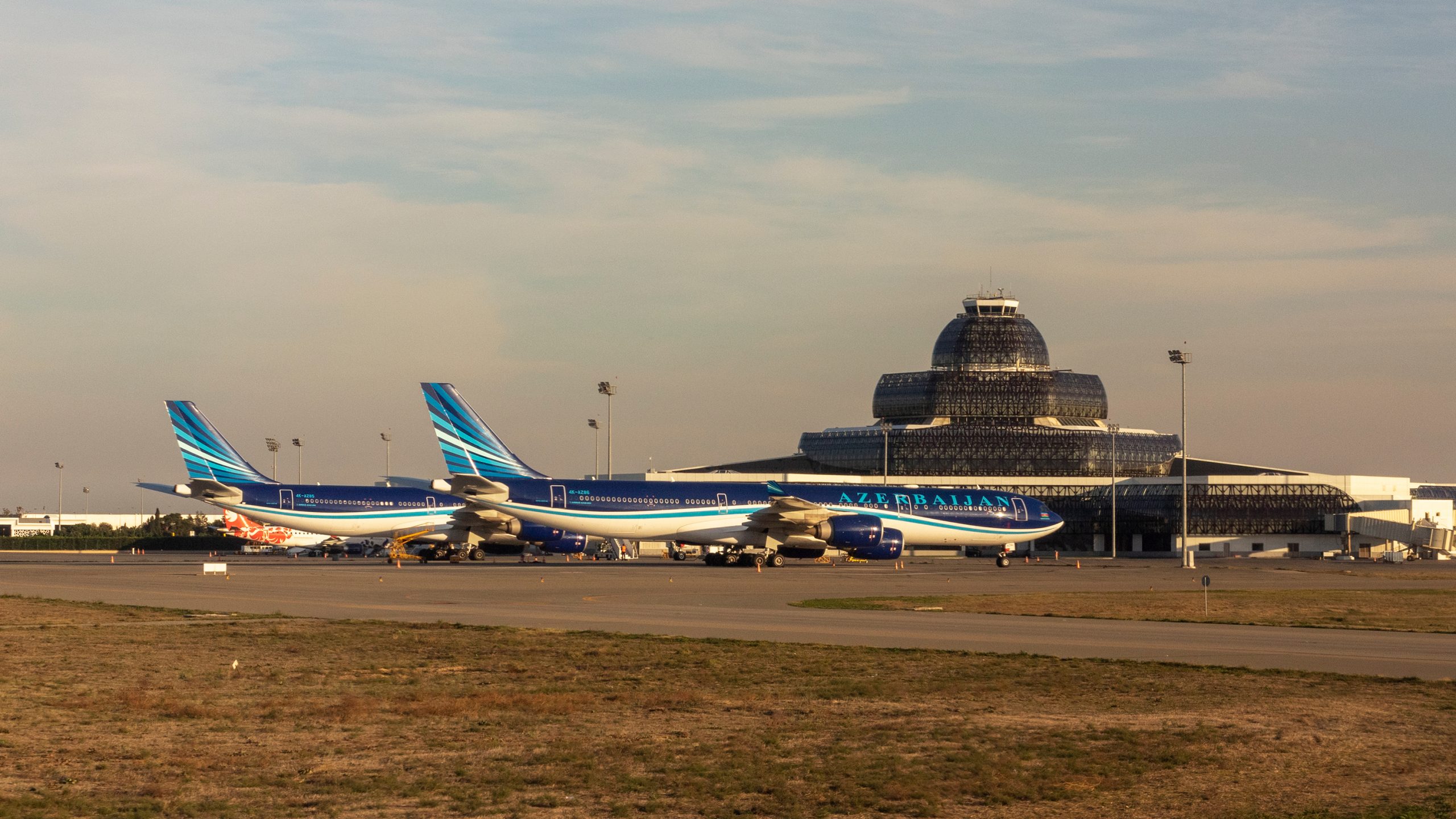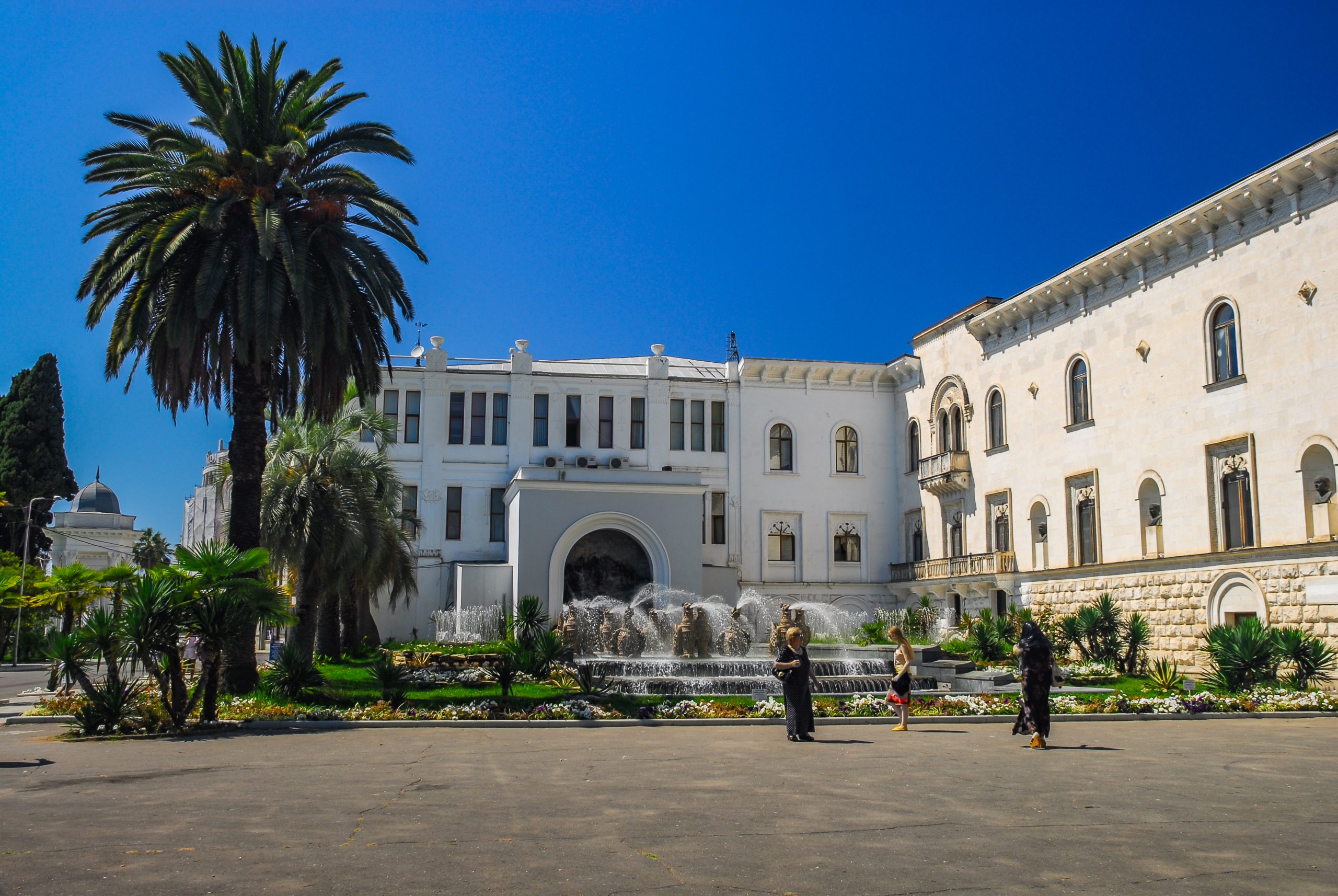Strategic Analysis Caucasus Brief
Bi-weekly review (6.9. 2021 – 19.9. 2021)
Tomáš Baranec
Armenia

Goris, Armenia. Photo: Elena Shchipkova/ Shutterstock.com
Armenia and Azerbaijan exchange three POWs
On September 8, two Armenian soldiers captured near the southern border between Armenia and Azerbaijan were exchanged for an Azerbaijani soldier who was detained after entering a house in Nagorno-Karabakh.
Artur Nalbandian and Aramais Torozyan were detained on July 14 near Lake Sev, in southern Armenia. Meanwhile, Azerbaijani serviceman Jamil Babaeyev was detained in Martakert (aze. Aghdara) in Nagorno-Karabakh on August 26 after entering a private home. The exchange was facilitated by the Russian peacekeeping contingent in Nagorno-Karabakh.
As the OC Media reminds since the end of the Second Nagorno-Karabakh war, 106 Armenian captives and Prisoners of War have been returned to Armenia. According to Armenian officials, Armenia returned all Azerbaijani captives, while the number of Armenians being held in Azerbaijan remains unclear. Azerbaijan has claimed that Armenia is holding seven of their soldiers captive.
Sources:
- AGHAYEV Ismi, AVETISYAN Ani, OC Media, „Armenia and Azerbaijan exchange prisoners“, https://oc-media.org/armenia-and-azerbaijan-exchange-prisoners/
Azerbaijan requires customs payments from Iranian trucks on the Goris-Kapan road
Armenian authorities have complained about Azerbaijani border guards searching and charging transport duties on Iranian cars passing through sections of Armenia’s Goris-Kapan road that are controlled by Azerbaijan. Meanwhile, Azerbaijani authorities have said that the checks and fees are part of established protocol, writes the OC Media.
Azerbaijan has established police and customs checkpoints on the section of the road between the Armenian cities of Goris and Kapan, which came under the control of Baku after the second Karabakh war last year.
According to the Civilnet Iranian drivers were told that they had to pay $130 to be allowed to drive through the road. Additionally, Azerbaijani troops reportedly erected banners on both sides of the road that read: „You are entering the territory of Azerbaijan“.
According to the official reports from Azerbaijan, customs posts appeared due to the fact that “numerous facts of entry of Iranian trucks into the part of Karabakh controlled by Russian peacekeepers have been established”.
In recent months, Azerbaijani authorities have expressed consternation with Iranian cargo vehicles entering the sections of Nagorno-Karabakh overseen by Russian peacekeepers. In August, Azerbaijan sent an official “diplomatic note” to Iran over the issue.
Armenia’s National Security Service has since announced that they are currently in discussion with the Russian border officials, who are stationed on that same stretch of road, to address the issue.
The Armenian opposition demands urgent and effective steps from the country’s authorities, as it believes that this situation raises questions related not only to security. The oppositionists also point to the possible economic consequences for Armenia, recalling that 40% of the country’s trade turnover is carried out through Iran.
Sources:
- AVETISYAN Ani, OC Media, „Azerbaijan levies duties on vehicles going through Armenia’s Goris-Kapan road“, https://oc-media.org/azerbaijan-levies-duties-on-vehicles-going-through-armenias-goris-kapan-road/
- JAM News, „Customs payments for Iranian trucks: what is happening at the Armenian-Azerbaijani border“, https://jam-news.net/customs-payments-for-iranian-trucks-what-is-happening-at-the-armenian-azerbaijani-border/
Azerbaijan inaugurates its first airport in Karabakh
Azerbaijan’s flag carrier Azerbaijan Airlines (AZAL) operated the first flight from the capital Baku to the Fuzuli International Airport in the Karabakh region on September 5.
Airbus A340-500, which is the largest passenger aircraft in AZAL’s fleet, completed the flight 35 minutes after departing Baku. Journalists, travel bloggers, and representatives of various other organisations were the first passengers to arrive at the airport. Simultaneously with the passenger flight, the Baku-based Silk Way Airlines conducted the first cargo transportation on board the Boeing 747-400 aeroplane from Baku to the Fuzuli International Airport.
Journalists on the trip reported that the construction of the airport was incomplete; officials say it will be fully ready by the end of September. Selim Akbay, the project manager for the airport’s construction, told journalists that it was built by 12 Turkish companies, utilising construction equipment “from Turkey, Russia, China, the United States, Germany, Finland and other countries.”
“There was no infrastructure here, we created it from scratch,” Kamil Aliyev, the director of the construction company Azvirt, told reporters at the opening in Fuzuli. “A lot of mines had to be cleared away.”
The government has also been building airports in Lachin and Zangilan, two other districts that were returned to Azerbaijan last year.
As the Eurasianet reports, it is not clear how much the state has been spending on airport construction. Recently released data from the State Statistics Committee showed that the government had spent a total of 269 million manats ($158 million) on post-war construction in Karabakh in the first half of 2021. Of that, the largest share was spent in Fuzuli: 75 million manats ($44 million).
Sources:
- ISAYEV Heydar, Eurasianet.org, „Azerbaijan inaugurates its first airport in Karabakh“, https://eurasianet.org/azerbaijan-inaugurates-its-first-airport-in-karabakh?utm_source=dlvr.it&utm_medium=twitter
- MEHDIYEV Mushvig, Caspian News, „Azerbaijan Airlines Operates First Flight to New Fuzuli Airport in Karabakh Region“, https://caspiannews.com/news-detail/azerbaijan-airlines-operates-first-flight-to-new-fuzuli-airport-in-karabakh-region-2021-9-5-55/
General Muradov completes mission as head of Russian peacekeepers in Karabakh
Lieutenant General Rustam Muradovs term as the head of the peacekeeping mission in Nagorno-Karabakh ended. Major General Mikhail Kosobokov was appointed as a new commander of the Russian peacekeepers.
Civilians have returned to Karabakh; life in the region “is in full swing,” Muradov has stated, adding that he was satisfied with the outcomes of his mission in the region. He has recalled that Russian peacemakers will stay in Karabakh at least until the end of 2025.
On September 6, Muradov met Arshak Karapetyan, the head of the Armenian MoD. The parties discussed the situation on the Armenian-Azerbaijani border. Also, Rustam Muradov introduced Mikhail Kosobokov, the new commander of the Russian peacemaking contingent, to Zakir Gasanov, the head of the Azerbaijani MoD, the website of the MoD has reported.
The new head of the mission, Kosobokov, worked in the post of the Deputy Commander of the 58th Troop Army of South Military District. Earlier, he led a Russian military base in Abkhazia.
Sources:
- Caucasian Knot, “Commander of Russian peacemakers, assess his work in Nagorno-Karabakh“, https://www.eng.kavkaz-uzel.eu/articles/56710/
- APA.az, „Rustam Muradov’s term as head of the peacekeeping mission in Karabakh ended“, https://apa.az/en/xeber/cis-countries-news/rustam-muradovs-term-as-head-of-the-peacekeeping-mission-in-karabakh-ended-357254
- APA, „Media: Major General Mikhail Kosobokov may replace Rustam Muradov“, https://apa.az/en/xeber/cis-countries-news/media-major-general-mikhail-kosobokov-may-replace-rustam-muradov-357304
- APA, „Mikhail Kosobokov appointed commander of Russian peacekeepers in Karabakh“, https://apa.az/en/xeber/foreign-news/mikhail-kosobokov-appointed-commander-of-russian-peacekeepers-in-karabakh-357440
Georgia failed the third pledge on the Judicial Reform
The Georgian government faced another harsh criticism from the West after it failed to approve the Constitutional amendment aimed at ensuring broad, multi-party support for an impartial Prosecutor General.
The European Union said on September 7 it “regrets that yet another commitment to reform the Judiciary was not upheld today”. The change was agreed upon as per the EU-brokered April 19 agreement.
The statement of the EU Delegation to Georgia highlighted that the withdrawal of the amendment is “the third setback within only two months, in terms of Georgia’s commitments to reform its judiciary.”
The EU recalled that earlier OSCE/ODIHR assessed the Supreme Court appointments this July, alongside those made over the past two years, as lacking “integrity, objectivity and credibility.” It added that the last week, the EU noted Georgia’s failure to “sufficiently address” the condition — the court reform — to EUR 75 million aid, which GD pre-emptively refused.
The European Union also asserted that strengthening the rule of law in Georgia remains of “crucial importance for the effective implementation of the EU-Georgia Association Agreement.”
The U.S. Embassy in Georgia stated in its turn that failure to approve the Constitutional amendment „is another missed opportunity to increase the independence, transparency, and integrity of Georgia’s judiciary“. The embassy stressed that the proposed change in the appointment process was recommended to Georgia by the Venice Commission, an international body of legal experts, in a report requested by the Parliament, as well as other international experts.
In his reaction, the ruling Georgian Dream party chair Irakli Kobakhidze has said the EU Ambassador Carl Hartzell and the U.S. Ambassador Kelly Degnan do need “appropriate legal consultants” and that “naturally, the ambassadors cannot analyse legal norms themselves.”
The EU and the U.S. statements are “regrettable” for different reasons, MP Kobakhidze noted, adding that “unfortunately, both embassies were given incorrect legal analyses.” The ruling party chair also asserted that the proposed change over the selection of the chief prosecutor was “legal nonsense,” which needed appropriate assessment, including by international partners.
Sources:
- Civil.ge, „EU: Georgia Failed Third Pledge on Judicial Reform“, https://civil.ge/archives/439281
- Civil.ge, „Kobakhidze Says EU, U.S. Ambassadors Need Better Legal Consultants“, https://civil.ge/archives/439308
- U.S. Embassy in Georgia, „U.S. Embassy Statement on Parliament’s First Reading of Post-April 19 Agreement Constitutional Amendments“ https://ge.usembassy.gov/u-s-embassy-statement-on-parliaments-first-reading-of-post-april-19-agreement-constitutional-amendments/#.YTeYX11Qol0.twitter
Abkhazia faces a shortage of fuel
Gas prices in Georgian breakaway region Abkhazia have gone up, and long queues line up at gas stations, informs JAM News.
The deficit became apparent in August, and the de-facto government increased fuel prices by about 15%. However, this measure failed to stabilise the situation.
In early September, due to the lack of gasoline, some gas stations were closed while others got too crowded. Sometimes, drivers had to wait in line for hours to refuel.
The government explains the situation by delivery disruptions caused by the excessive congestion of the Russian railway, a large number of tourists, and an exhausted quota for duty-free import of Russian fuel into the republic.
Sources:
- JAM News, Abkhazia – shortage of fuel and queues for gasoline, https://jam-news.net/abkhazia-shortage-of-fuel-and-queues-for-gasoline/
Leaked kompromat targets Georgian orthodox Church, journalists and foreign diplomats
On September 14, several major Georgian media outlets reported having received a link to a website a day earlier containing thousands of files of secret surveillance records. A massive cache of surveillance files was allegedly leaked by a former security officer.
According to reports by several Georgian media, the dossiers produced since 2014 mostly pertain to „hundreds“ of religious figures, including top-tier representatives of the Georgian Orthodox Church, as well as the staff of Patriarchate, indicating they were monitored closely by the authorities.
According to Tabula, the files were organised in categories entitled „adulterers“, „ties with natsebi“, a pejorative term for members of the formerly ruling United National Movement Party, „LGBT organisations“, „crime and drug abuse“, „Russian influences“, and more, writes the OC Media.
Within a day of the alleged dump of secret files, several media workers, including the director and anchor of TV channel Mtavari, Nika Gvaramia, and another anchor, Eka Kvesitadze, the head of TV channel Pirveli’s news service Nodar Meladze, TV Formula journalist Nino Vardzelashvili, and Tabula editor Levan Sutidze corroborated the reports that concerned their own activities.
According to the leaked files, the head of the Georgian Orthodox Church, Patriarch Ilia II, planned to step down in 2020 for unknown reasons. Dimitri Shiolashvili, Patriarch’s nephew and the Head of Batumi and Lazeti Eparchy, “spoke strictly” with Ilia II and dissuaded him from resigning, reads one of the documents.
The alleged report of a security officer eavesdropping on the conversation between Shiolashvili and Patriarch’s aid Davit Chincharauli suggests that the authorities had told the Patriarch’s administration that they deemed Ilia II’s resignation “inadmissible”. The authorities were reportedly worried that it would reflect badly on the “public mood as well as ratings of the government”.
Georgian media outlets later reported that the alleged files of the State Security Service include details on conversations of the EU Ambassador to Georgia Carl Hartzell, U.S. diplomats, Israeli Ambassador Ran Gidor, as well as employees of other diplomatic missions in Georgia. “This is a very serious matter since it has implications in the framework of the Vienna Convention on Diplomatic Relations,” said Peter Stano, Lead Spokesperson for Foreign Affairs and Security Policy of the European Union. “We’re taking appropriate steps in this context as we always do in such situations, but given the nature of the alleged incident, we will not say more at the moment,” he added.
The Georgian Chief Prosecutor’s Office has meanwhile started questioning the journalists from different TV channels after it urged the representatives of various media outlets to cooperate with law enforcers.
The ruling Georgian Dream (GD) party claims that the largest opposition United National Movement (UNM) party stands behind the leaked files calling it a “dirty, anti-state provocation aiming to spark tension in the country ahead of the October 2 municipal elections”.
Georgian Prime Minister Irakli Garibashvili stated that the State Security Service (SSS) will prevent the surveillance, noting that many people and countries have the opportunity to carry out such activities. The GD also stated that the former PM Giorgi Gakharia, who now leads the For Georgia political party after his resignation in February following a dispute with the ruling party, and the former deputy head of the SSS Aleksandre Khojevanishvili, who is a brother of For Georgia’s member Giorgi Khojevanishvili might be connected to the case.
On September 13, hours after the leaks became available to major local media groups, TV channel Mtavari identified Akaki Nemsadze, who they said was a former SSS employee, as the possible leaker. Mtavari reported that Nemsadze took his own life on July 8 and speculated that he could have arranged for the leak to take place after his death.
Sources:
- KINCHA Shota, „OC Media, Leaked ‘kompromat’ against the clergy rocks Georgia“, https://oc-media.org/leaked-kompromat-against-the-clergy-rocks-georgia/
- KINCHA Shota, „OC Media, SSG Files: Georgian Patriarch Ilia II planned to resign in 2020“, https://oc-media.org/ssg-files-georgian-patriarch-ilia-ii-planned-to-resign-in-2020/
- Agenda.ge, „Leaked files: investigation underway, journalists being questioned“, https://agenda.ge/en/news/2021/2685
- Civil.ge, „Reports: Georgian Security Spied on EU, U.S. Ambassadors“, https://civil.ge/archives/440471
- Civil.ge, „EU ‘Taking Appropriate Steps’ on Georgia’s Alleged Spying on EU Diplomats“, https://civil.ge/archives/441030
Georgian Alt-Right Channel got a national broadcaster status
The Georgian National Communications Commission (GNCC) has granted “national broadcaster” status to Alt-Info, obligating all TV providers in the country to provide the channel to subscribers. The far-right extremist group led efforts to organise and coordinate the mob violence against journalists and activists on July 5, informs the OC Media.
The Georgian watchdog group Media Rights reported that the state telecommunications regulator’s September 9 decision would come into effect from September 15.
The move will force TV providers Silknet and Stereo+ to begin airing Alt-Info. Silknet had previously resisted doing so, citing “technical reasons”, before coming to an agreement with the channel following the GNCC’s decision.
Silknet will join other large TV providers such as Magticom and Akhali Kselebi in broadcasting the channel.
Alt-Info has been actively expressing and encouraging violence and aggression against the Tbilisi Pride march while founders of the media outlet were participating in the counter-rally on July 5, writes the Agenda.ge. Later in July, police searched the apartments of Alt-Info’s founder and its members; however, no case was filed against them.
Alt-Info had lodged complaints against Silknet to the Georgian National Communication Commission (GNCC) several times before they reached the agreement. Based on the GNCC, Silknet was obliged to comply with Alt-Info’s request otherwise, it would have been fined permanently until the issue was resolved.
Alt-Info successfully penetrated the TV sets of Georgians in January, soon after Facebook removed most of the accounts associated with them in October last year and deleted more in July.
Besides resorting to messaging platforms and YouTube, and retaining a diminished presence on Facebook, Alt-Info successfully gained a broadcasting license from GNCC in January. This enabled them to launch their cable TV channel that month.
Sources:
- KINCHA Shota, OC Media, „Extremist group behind Tbilisi Pride violence granted ‘national broadcaster’ status“, https://oc-media.org/extremist-group-behind-tbilisi-pride-violence-granted-national-broadcaster-status/
- Agenda.ge, „Georgian right-wing media outlet Alt-Info to be aired on local provider Silknet after months of dispute“, https://agenda.ge/en/news/2021/2598



Contact us